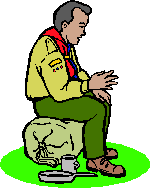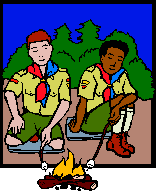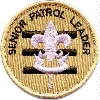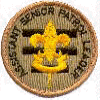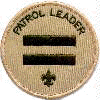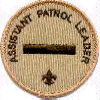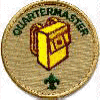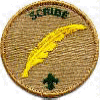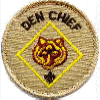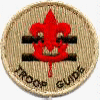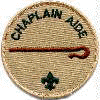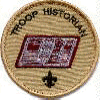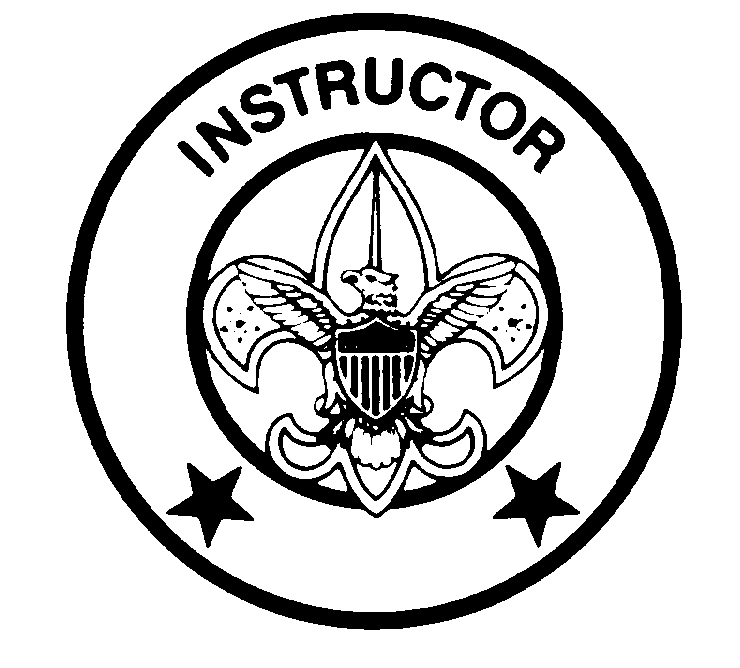|
Leading the way... What does that mean? Think about being a Cub Scout. You came to Den meetings and did a lot of different and fun things. But who decided what to do and who planned the activities? The Den Leaders, right? Sports teams are a lot of fun, too. But who decides who plays what position, who’s on the starting lineup and when to substitute? The coach, right? There is one thing that makes Scouting different from all other youth groups. Do you know what it is? Well, it’s not the uniform. Every soccer, basketball, softball, and baseball team has a uniform It is not the fun activities. There are a lot of other things that are fun. And it certainly isn’t cleaning dirty pots and pans on a campout!!! What makes Scouting special is that YOU make the decisions! That’s right! YOU run the Troop. Baden-Powell made it very plain in Aids to Scoutmastership when he wrote, "The best progress is made in those Troops where power and This is a real decision making power. And it’s not just the Patrol Leaders. All of the Troop leadership positions have a hand in making the Troop run. As a Troop Leader, you will:
Sound cool? It really is! The adults are there to provide support but YOU will be making the decisions. Because being a leader is more than just sewing on a patch, we have put together job descriptions for the Troop leadership positions. They will give you a good idea of what each job is all about and what you will be required to do. So are you ready to "Lead the way?" We sure hope so! |
| (Click on a badge for information on that position. Use the "back" button on your browser to return to this table) |
GENERAL INFORMATION
Type: Elected by members of the Troop.
Term: 6 month
Reports to:
Scoutmaster
Description: The
Senior Patrol Leader is elected by the Scouts to represent them as the top
junior leader in the Troop.
Comments: The Senior Patrol Leader is the focal point of the Troop. He needs to
attend as close to all Troop functions as possible. One of the major parts of
the SPL’s job is to appoint other Troop leaders. He must choose leaders who are able,
not just his friends or other popular Scouts.
QUALIFICATIONS
Age: none
Rank: 1st Class or higher (Scoutmaster may exempt this qualification)
Experience: Previous experience as
SPL, ASPL, PL or APL (Scoutmaster may exempt
this qualification)
Attendance: At least 75% over previous 6 months
PERFORMANCE REQUIREMENTS
Training: You must attend Troop Junior Leadership training even if you have
attended in the past.
Attendance: You are expected to attend at least 85% of all Troop meetings, Patrol
Leader’s Council meetings, outings, and service projects. If your attendance is low, or you have (3) unexcused absences in a row, you can be removed from
office.
Effort: You are expected to give this job your best effort.
GENERAL LEADERSHIP RESPONSIBILITIES
Uniform: Set the example by wearing your uniform correctly. This means you will
wear all of the parts of the Troop uniform, shirt tail tucked in, with all required badges in their correct locations.
Behavior: Set the example by living the Scout Oath and Law in your every day life.
Show Scout Spirit in everything you do or say.
Attendance: Set the example by being an active Scout. Be on-time for meetings and
activities. You must call the Scoutmaster if you are not going to be at a meeting or if you suddenly have to miss an outing. You
also need to make sure that the Assistant Senior Patrol Leader is ready to assume your responsibilities.
SPECIFIC LEADERSHIP RESPONSIBILITIES
Runs all Troop meetings, events, outings, activities, and the annual Program
Planning
Conference.
Runs the Patrol Leader’s Council meeting.
Appoints other Troop junior leaders with the advice and counsel of the Scoutmaster.
Assigns duties and responsibilities to junior leaders.
Assists the Scoutmaster with Junior Leader Training.
ASSISTANT SENIOR PATROL LEADER
GENERAL INFORMATION
Type: Appointed by the Senior Patrol Leader.
Term: 6 month
Reports to: Senior Patrol Leader
Description: The Assistant Senior Patrol Leader is the second highest ranking
patrol leader in the Troop. The Assistant Senior Patrol Leader acts as the
Senior Patrol Leader in the absence of the SPL or when called upon. He also provides
leadership to other junior leaders in the Troop.
Comments: The most important part of the ASPL position is his work with the other
junior leaders. The ASPL should be familiar with the other positions and
stay current with the work being done.
QUALIFICATIONS
Age: none
Rank: 1st Class or higher (Scoutmaster may exempt this qualification)
Experience: Previous experience as
SPL, ASPL, Scribe, Historian, Quartermaster,
Historian, Librarian, Instructor, PL or APL (Scoutmaster may exempt this
qualification)
Attendance: At least 50% over previous 6 months
PERFORMANCE REQUIREMENTS
Training: You must attend Troop Junior Leadership training even if you have
attended in the past.
Attendance: You are expected to attend at least 80% of all Troop meetings, Patrol
Leader’s Council meetings, outings, and service projects. If your attendance is low, or you have (3) unexcused absences in a row, you can be removed from
office.
Effort: You are expected to give this job your best
effort.
GENERAL LEADERSHIP RESPONSIBILITIES
Uniform: Set the example by wearing your uniform correctly. This means you will
wear all of the parts of the Troop uniform, shirt tail tucked in, with all
required badges in their correct locations.
Behavior: Set the example by living the Scout Oath and Law in your every day life.
Show Scout Spirit in everything you do or say.
Attendance: Set the example by being an active Scout. Be on-time for meetings and
activities. You must call the Senior Patrol Leader or Scoutmaster if you are not going to be at a meeting or if you suddenly have to miss an outing. You also must
make sure someone will assume your responsibilities.
SPECIFIC LEADERSHIP RESPONSIBILITIES
Helps the Senior Patrol Leader lead meetings and other activities
Runs the Troop in the absence of the Senior Patrol Leader
Helps train and supervise the Troop Scribe, Quartermaster, Instructor, Librarian,
Historian, and Chaplain Aide
Serves as a member of the Patrol Leaders’ Council
GENERAL INFORMATION
Type: Elected by members of the patrol.
Term: 6 month
Reports to: Senior Patrol Leader
Description: The Patrol Leader is the elected leader of his patrol. He represents
them to the Patrol Leaders’ Council.
Comments: The Patrol Leader may easily be the most important job in the Troop. He
has the closest contact with patrol members and is in the perfect position to help and guide them. The Patrol Leaders, along with the Senior Patrol Leader
and Assistant Senior Patrol Leader are the primary members of the
Patrol Leaders’ Council.
QUALIFICATIONS
Age: none
Rank: none
Experience: none
Attendance: At least 75% over previous 6 months
PERFORMANCE REQUIREMENTS
Training: You must attend Troop Junior Leadership training even if you have
attended in the past.
Attendance: You are expected to attend at least 80% of all Troop meetings, Patrol
Leader’s Council meetings, outings, and service projects. If your
attendance is low, or you have (3) unexcused absences in a row, you can be removed from
office.
Effort: You are expected to give this job your best effort.
GENERAL LEADERSHIP RESPONSIBILITIES
Uniform: Set the example by wearing your uniform correctly. This means you will
wear all of the parts of the Troop uniform, shirt tail tucked in, with all required badges in their correct locations.
Behavior: Set the example by living the Scout Oath and Law in your every day life.
Show Scout Spirit in everything you do or say.
Attendance: Set the example by being an active Scout. Be on-time for meetings and
activities. You must call the Senior Patrol Leader or Scoutmaster if you
are not going to be at a meeting or if you suddenly have to miss an outing. You also need
to make sure that the Assistant Patrol Leader is ready to assume
your responsibilities.
SPECIFIC LEADERSHIP RESPONSIBILITIES
Appoints the Assistant Patrol Leader
Represents the patrol on the Patrol Leaders’ Council
Plans and steers patrol meetings
Helps Scouts advance
Acts as chief recruiter of new Scouts
Keeps patrol members informed
Knows what his patrol members and other leaders can do.
GENERAL INFORMATION
Type: Appointed by Scoutmaster.
Term: 1 year
Reports to: Scoutmaster and Den Leader
Description: The Den
Chief works with a Cub Scout or WEBELOS Den Leader, helping to
run the Den meeting, and helps out the Den at Pack Meetings. He demonstrates the best of Boy Scouting to the Cubs, to convince them to join a Boy Scout
Troop upon graduation from the Cub Scout Pack.
Comments: The Den Chief provides knowledge of games and Scout skills that many Den
Leaders lack. The Den Chief is also a recruiter for the Troop. This
function is important because no Troop can thrive without new members and most new members
come from Cub Scouting.
QUALIFICATIONS
Age: 14 or older
Rank: 1st Class or higher (Scoutmaster may exempt this qualification)
Experience: none
Attendance: At least 75% over previous 6 months
PERFORMANCE REQUIREMENTS
Training: You must attend Troop Junior Leadership training even if you have
attended in the past.
Attendance: You are expected to attend at least 85% of all Troop meetings, Patrol
Leader’s Council meetings, outings, and service projects. If your
attendance is low, or you have (3) unexcused absences in a row, you can be removed from
office.
Effort: You are expected to give this job your best effort.
GENERAL LEADERSHIP RESPONSIBILITIES
Uniform: Set the example by wearing your uniform correctly. This means you will
wear all of the parts of the Troop uniform, shirt tail tucked in, with all
required badges in their correct locations.
Behavior: Set the example by living the Scout Oath and Law in your every day life.
Show Scout Spirit in everything you do or say.
Attendance: Set the example by being an active Scout. Be on-time for meetings and
activities. You must call the Senior Patrol Leader or Scoutmaster if you are not going to be at a meeting or if you suddenly have to miss an outing. You also need
to make sure that someone will assume your responsibilities if
you have to miss your Den meeting.
SPECIFIC LEADERSHIP RESPONSIBILITIES
Know the purpose of Cub Scouting
Help Cub Scouts advance through Cub Scout ranks
Encourage Cub Scouts to join a Boy Scout Troop upon graduation
Assists with activities in the Den meetings
Is a friend to the boys in the Den
Helps out at weekly Den meetings and monthly Pack meetings
Meets with adult members of the Den, Pack, and Troop as necessary
GENERAL INFORMATION
Type: Appointed by Scoutmaster.
Term: 1 year
Reports to: Scoutmaster
Description: The Instructor teaches Scouting skills.
Comments: The Instructor will work closely both the Troop Guide and with the
Assistant Scoutmaster for New Scouts. The Instructor does not have to be
an expert but should be able to teach the Scoutcraft skills needed for Tenderfoot, Second
Class, and First Class ranks. The Troop can have more than one Instructor.
QUALIFICATIONS
Age: 14 or older
Rank: 1st Class or higher
Experience: none
Attendance: At least 50% over previous 6 months
PERFORMANCE REQUIREMENTS
Training: You must attend Troop Junior Leadership training even if you have
attended in the past.
Attendance: You are expected to attend at least 75% of all Troop meetings, Patrol
Leader’s Council meetings, outings, and service projects. If your
attendance is low, or you have (3) unexcused absences in a row, you can be removed from
office.
Effort: You are expected to give this job your best effort.
GENERAL LEADERSHIP RESPONSIBILITIES
Uniform: Set the example by wearing your uniform correctly. This means you will
wear all of the parts of the Troop uniform, shirt tail tucked in, with all
required badges in their correct locations.
Behavior: Set the example by living the Scout Oath and Law in your every day life.
Show Scout Spirit in everything you do or say.
Attendance: Set the example by being an active Scout. Be on-time for meetings and
activities. You must call the Senior Patrol Leader or Scoutmaster if you are not going to be at a meeting or if you suddenly have to miss an outing. You also need
to make sure someone will assume your responsibilities.
SPECIFIC LEADERSHIP RESPONSIBILITIES
Teaches basic Scouting skills in Troop and patrols.
GENERAL INFORMATION
Type: Appointed by the Scoutmaster.
Term: 1 year
Reports to: Scoutmaster
Description: The Troop Guide works closely with the new Scout Patrol and the
Assistant Scoutmaster for the new Scout patrol to insure each member completes First Class rank in their first year. He also helps each new Patrol Leader learn
his position.
Comments: The first year as a Boy Scout is a critical time with new places, new
people, new rules, and new activities. The Troop Guide is a friend to the new
Scouts and makes the first year fun and successful
QUALIFICATIONS
Age: 14 or older
Rank: 1st Class or higher
Experience: none
Attendance: At least 75% over previous 6 months
PERFORMANCE REQUIREMENTS
Training: You must attend Troop Junior Leadership training even if you have
attended in the past.
Attendance: You are expected to attend at least 75% of all Troop meetings, Patrol
Leader’s Council meetings, outings, and service projects. If your attendance is low, or you have (3) unexcused absences in a row, you can be removed from
office.
Effort: You are expected to give this job your best effort.
GENERAL LEADERSHIP RESPONSIBILITIES
Uniform: Set the example by wearing your uniform correctly. This means you will
wear all of the parts of the Troop uniform, shirt tail tucked in, with all required badges in their correct locations.
Behavior: Set the example by living the Scout Oath and Law in your every day life.
Show Scout Spirit in everything you do or say.
Attendance: Set the example by being an active Scout. Be on-time for meetings and
activities. You must call the Scoutmaster if you are not going to be at a meeting or if you suddenly have to miss an outing. You also need to make sure that someone
is ready to assume your responsibilities.
SPECIFIC LEADERSHIP RESPONSIBILITIES
Introduces new Scouts to Troop operations
Guides new Scouts through early Scouting activities
Shields new Scouts from harassment by older Scouts
Helps new Scouts earn First Class in their first year
Teaches basic Scout skills
Coaches the patrol leader of the new Scout patrol on his duties
Attends and works with the patrol leader at Patrol Leaders’ Council meetings
Assists the Assistant Scoutmaster with training
Counsels individual Scouts on Scouting challenges
ASSISTANT PATROL LEADER
GENERAL INFORMATION
Type: Appointed by the Patrol Leader.
Term: 6 month
Reports to: Patrol Leader
Description: The Patrol Leader is appointed by the Patrol Leader and leads the
patrol in his absence.
Comments: Substituting for the Patrol Leader is only part of the Assistant Patrol
Leader’s Job. The APL actively helps run the patrol.
QUALIFICATIONS
Age: none
Rank: none
Experience: none
Attendance: At least 50% over previous 6 months
PERFORMANCE REQUIREMENTS
Training: You must attend Troop Junior Leadership training even if you have
attended in the past.
Attendance: You are expected to attend at least 75% of all Troop meetings, Patrol
Leader’s Council meetings, outings, and service projects. If your attendance is low, or you have (3) unexcused absences in a row, you can be removed from
office.
Effort: You are expected to give this job your best effort.
GENERAL LEADERSHIP RESPONSIBILITIES
Uniform: Set the example by wearing your uniform correctly. This means you will
wear all of the parts of the Troop uniform, shirt tail tucked in, with all required badges in their correct locations.
Behavior: Set the example by living the Scout Oath and Law in your every day life.
Show Scout Spirit in everything you do or say.
Attendance: Set the example by being an active Scout. Be on-time for meetings and
activities. You must call the Patrol Leader, Senior Patrol Leader or
Scoutmaster if you are not going to be at a meeting or if you suddenly have to miss an
outing. You also need to make sure that someone will assume your duties.
SPECIFIC LEADERSHIP RESPONSIBILITIES
Helps the Patrol Leader plan and steer patrol meetings and activities
Helps the Patrol Leader keep patrol members informed
CHAPLAIN AIDE
GENERAL INFORMATION
Type: Appointed by the Senior Patrol Leader.
Term: 6 month
Reports to: Assistant Senior Patrol Leader
Description: The Chaplain Aide works with the Troop Chaplain to meet the religious
needs of Scouts in the Troop. He also works to promote the religious awards program.
Comments: "Duty to God" is one of the core beliefs of Scouting. The
Chaplain Aide helps everyone in the Troop by preparing short religious observations
for campouts and other functions. The Chaplain Aide does not always lead the observations
himself and can have other Troop members help.
QUALIFICATIONS
Age: none
Rank: none
Experience: none
Attendance: At least 50% over previous 6 months
PERFORMANCE REQUIREMENTS
Training: You must attend Troop Junior Leadership training even if you have
attended in the past.
Attendance: You are expected to attend at least 75% of all Troop meetings, Patrol
Leader’s Council meetings, outings, and service projects. If your attendance is low, or you have (3) unexcused absences in a row, you can be removed from
office.
Effort: You are expected to give this job your best effort.
GENERAL LEADERSHIP RESPONSIBILITIES
Uniform: Set the example by wearing your uniform correctly. This means you will
wear all of the parts of the Troop uniform, shirt tail tucked in, with all
required badges in their correct locations.
Behavior: Set the example by living the Scout Oath and Law in your every day life.
Show Scout Spirit in everything you do or say.
Attendance: Set the example by being an active Scout. Be on-time for meetings and
activities. You must call the Assistant Senior Patrol Leader, Senior Patrol Leader or Scoutmaster if you are not going to be at a meeting or if you suddenly have to
miss an outing. You also need to make sure that someone will
assume your duties.
SPECIFIC LEADERSHIP RESPONSIBILITIES
Assist the Troop Chaplain with religious services at Troop activities
Tell Scouts about the religious emblem program for their faith
Makes sure religious holidays are considered during Troop program planning
Helps plan religious observances in Troop activities
GENERAL INFORMATION
Type: Appointed by the Senior Patrol Leader.
Term: 6 month
Reports to: Assistant Senior Patrol Leader
Description: The Troop Historian keeps a historical record or scrapbook of Troop
activities.
Comments: The true value of a good Historian does not show up until years later.
The Historian provides materials for displays and presentations of current activities. In addition, the Work of the Historian provides a link with the past.
QUALIFICATIONS
Age: none
Rank: none
Experience: none, but an interest in photography is helpful.
Attendance: At least 50% over previous 6 months
PERFORMANCE REQUIREMENTS
Training: You must attend Troop Junior Leadership training even if you have
attended in the past.
Attendance: You are expected to attend at least 60% of all Troop meetings, Patrol
Leader’s Council meetings, outings, and service projects. If your attendance is low, or you have (3) unexcused absences in a row, you can be removed from
office.
Effort: You are expected to give this job your best effort.
GENERAL LEADERSHIP RESPONSIBILITIES
Uniform: Set the example by wearing your uniform correctly. This means you will
wear all of the parts of the Troop uniform, shirt tail tucked in, with all
required badges in their correct locations.
Behavior: Set the example by living the Scout Oath and Law in your every day life.
Show Scout Spirit in everything you do or say.
Attendance: Set the example by being an active Scout. Be on-time for meetings and
activities. You must call the Scoutmaster if you are not going to be at a meeting or if you suddenly have to miss an outing. You also need to make sure that someone
will assume your responsibilities.
SPECIFIC LEADERSHIP RESPONSIBILITIES
Gather pictures and facts about past Troop activities and keeps them in a historical file
or scrapbook.
Takes care of Troop trophies, ribbons, and souvenirs of Troop activities.
Keeps information about former members of the Troop.
GENERAL INFORMATION
Type: Appointed by Senior Patrol Leader.
Term: 6 month
Reports to: Assistant Senior Patrol Leader
Description: The Troop Librarian takes care of Troop literature
Comments: The library contains books of historical value as well as current
materials. The library is a Troop resource worth hundreds of dollars. The Librarian manages this resource for the
Troop.
QUALIFICATIONS
Age: none
Rank: none
Experience: none
Attendance: At least 50% over previous 6 months
PERFORMANCE REQUIREMENTS
Training: You must attend Troop Junior Leadership training even if you have
attended in the past.
Attendance: You are expected to attend at least 60% of all Troop meetings, Patrol
Leader’s Council meetings, outings, and service projects. If your
attendance is low, or you have (3) unexcused absences in a row, you can be removed from
office.
Effort: You are expected to give this job your best effort.
GENERAL LEADERSHIP RESPONSIBILITIES
Uniform: Set the example by wearing your uniform correctly. This means you will
wear all of the parts of the Troop uniform, shirt tail tucked in, with all
required badges in their correct locations.
Behavior: Set the example by living the Scout Oath and Law in your every day life.
Show Scout Spirit in everything you do or say.
Attendance: Set the example by being an active Scout. Be on-time for meetings and
activities. You must call the Assistant Senior Patrol Leader or Scoutmaster if you are not going to be at a meeting or if you suddenly have to miss an
outing. You also need to make sure that someone will assume your responsibilities.
SPECIFIC LEADERSHIP RESPONSIBILITIES
Set up and take care of the Troop Library
Keeps a record of books and pamphlets owned by the Troop
Insures new or replacement items are added as needed
Keeps books and pamphlets available for borrowing
Keeps a system for checking books and pamphlets in and out
Follows up on late returns
Accepts donations of used merit badge books and enters them into library records
GENERAL INFORMATION
Type: Appointed by Senior Patrol Leader
Term: 6 month
Reports to: Assistant Senior Patrol Leader
Description: The Troop Quartermaster keeps track of Troop equipment and sees that
it is kept in good working order.
Comments: The Quartermaster does most of his work around campouts. There are times
when the Quartermaster has to be available to check equipment in and out.
QUALIFICATIONS
Age: none
Rank: none
Experience: none
Attendance: At least 50% over previous 6 months
PERFORMANCE REQUIREMENTS
Training: You must attend Troop Junior Leadership training even if you have
attended in the past.
Attendance: You are expected to attend at least 60% of all Troop meetings, Patrol
Leader’s Council meetings, outings, and service projects. If your attendance is low, or you have (3) unexcused absences in a row, you can be removed from
office.
Effort: You are expected to give this job your best effort.
GENERAL LEADERSHIP RESPONSIBILITIES
Uniform: Set the example by wearing your uniform correctly. This means you will
wear all of the parts of the Troop uniform, shirt tail tucked in, with all required badges in their correct locations.
Behavior: Set the example by living the Scout Oath and Law in your every day life.
Show Scout Spirit in everything you do or say.
Attendance: Set the example by being an active Scout. Be on-time for meetings and
activities. You must call the Assistant Senior Patrol Leader or Scoutmaster if you are not going to be at a meeting or if you suddenly have to miss an
outing. You also need to make sure that someone will assume your responsibilities.
SPECIFIC LEADERSHIP RESPONSIBILITIES
Keeps records on patrol and Troop Equipment
Makes sure equipment is in good working order
Issues equipment and makes sure it is returned in good condition
Make suggestions for new or replacement items
Works with Troop Committee Member responsible for equipment
Works with Service Patrol to get US, Troop, and patrol flags for meetings and ceremonies
and puts them away afterward
GENERAL INFORMATION
Type: Appointed by Senior Patrol Leader
Term: 6 month
Reports to: Assistant Senior Patrol Leader
Description: The Scribe keeps Troop records. He records the activities of the
Patrol Leaders’ Council and keeps a record of dues, advancement, and Scout
attendance at Troop meetings.
Comments: To be a good Scribe, you need to attend nearly all Troop and Patrol
Leaders’ Council meetings.
QUALIFICATIONS
Age: none
Rank: none
Experience: none
Attendance: At least 60% over previous 6 months
PERFORMANCE REQUIREMENTS
Training: You must attend Troop Junior Leadership training even if you have
attended in the past.
Attendance: You are expected to attend at least 85% of all Troop meetings, Patrol
Leader’s Council meetings, outings, and service projects. If your
attendance is low, or you have (3) unexcused absences in a row, you can be removed from
office.
Effort: You are expected to give this job your best effort.
GENERAL LEADERSHIP RESPONSIBILITIES
Uniform: Set the example by wearing your uniform correctly. This means you will
wear all of the parts of the Troop uniform, shirt tail tucked in, with all required badges in their correct locations.
Behavior: Set the example by living the Scout Oath and Law in your every day life.
Show Scout Spirit in everything you do or say.
Attendance: Set the example by being an active Scout. Be on-time for meetings and
activities. You must call the Assistant Senior Patrol Leader or
Scoutmaster if you are not going to be at a meeting or if you suddenly have to miss an
outing. You also need to make sure someone will assume your responsibilities.
SPECIFIC LEADERSHIP RESPONSIBILITIES
Attends and keeps a log of Patrol Leaders’ Council meetings
Records individual Scout attendance and dues payment
Records individual Scout advancement progress
Works with the Troop Committee Member responsible for records and finance


